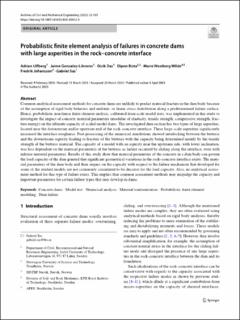| dc.contributor.author | Ulfberg, Adrian | |
| dc.contributor.author | Gonzalez-Libreros, Jaime | |
| dc.contributor.author | Das, Oisik | |
| dc.contributor.author | Bista, Dipen | |
| dc.contributor.author | Westberg Wilde, Marie | |
| dc.contributor.author | Johansson, Fredrik | |
| dc.contributor.author | Sas, Gabriel | |
| dc.date.accessioned | 2023-08-28T06:57:34Z | |
| dc.date.available | 2023-08-28T06:57:34Z | |
| dc.date.created | 2023-05-15T10:25:50Z | |
| dc.date.issued | 2023 | |
| dc.identifier.citation | Archives of Civil and Mechanical Engineering (ACME). 2023, 23 (2), . | |
| dc.identifier.issn | 1644-9665 | |
| dc.identifier.uri | https://hdl.handle.net/11250/3085907 | |
| dc.description.abstract | Common analytical assessment methods for concrete dams are unlikely to predict material fracture in the dam body because of the assumption of rigid body behavior and uniform- or linear stress distribution along a predetermined failure surface. Hence, probabilistic non-linear finite element analysis, calibrated from scale model tests, was implemented in this study to investigate the impact of concrete material parameters (modulus of elasticity, tensile strength, compressive strength, fracture energy) on the ultimate capacity of scaled model dams. The investigated dam section has two types of large asperities, located near the downstream and/or upstream end of the rock–concrete interface. These large-scale asperities significantly increased the interface roughness. Post-processing of the numerical simulations showed interlocking between the buttress and the downstream asperity leading to fracture of the buttress with the capacity being determined mainly by the tensile strength of the buttress material. The capacity of a model with an asperity near the upstream side, with lower inclination, was less dependent on the material parameters of the buttress as failure occurred by sliding along the interface, even with inferior material parameters. Results of this study show that material parameters of the concrete in a dam body can govern the load capacity of the dam granted that significant geometrical variations in the rock–concrete interface exists. The material parameters of the dam body and their impact on the capacity with respect to the failure mechanism that developed for some of the studied models are not commonly considered to be decisive for the load capacity. Also, no analytical assessment method for this type of failure exists. This implies that common assessment methods may misjudge the capacity and important parameters for certain failure types that may develop in dams. | |
| dc.language.iso | eng | |
| dc.subject | Material randomization | |
| dc.subject | Material randomization | |
| dc.subject | Concrete dams | |
| dc.subject | Concrete dams | |
| dc.subject | Numerical analysis | |
| dc.subject | Numerical analysis | |
| dc.subject | Model test | |
| dc.subject | Model test | |
| dc.title | Probabilistic finite element analysis of failures in concrete dams with large asperities in the rock–concrete interface | |
| dc.title.alternative | Probabilistic finite element analysis of failures in concrete dams with large asperities in the rock–concrete interface | |
| dc.type | Peer reviewed | |
| dc.type | Journal article | |
| dc.description.version | publishedVersion | |
| dc.subject.nsi | VDP::Materialteknologi: 520 | |
| dc.subject.nsi | VDP::Materials science and engineering: 520 | |
| dc.source.pagenumber | 17 | |
| dc.source.volume | 23 | |
| dc.source.journal | Archives of Civil and Mechanical Engineering (ACME) | |
| dc.source.issue | 2 | |
| dc.identifier.doi | 10.1007/s43452-023-00652-4 | |
| dc.identifier.cristin | 2147458 | |
| dc.relation.project | Andre: FORMAS, Grant No. 2019-01236 | |
| dc.relation.project | Norges forskningsråd: 244029 | |
| dc.relation.project | Andre: Swedish Hydropower Center (SVC). Grant VKU14169 | |
| dc.relation.project | Andre: Luleå University of Technology, Sweden | |
| cristin.ispublished | true | |
| cristin.fulltext | original | |
| cristin.qualitycode | 1 | |
